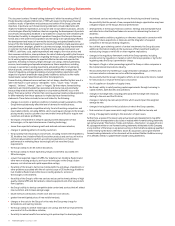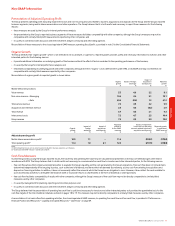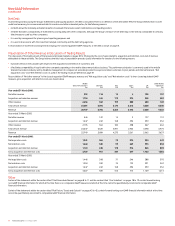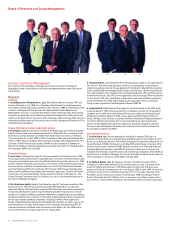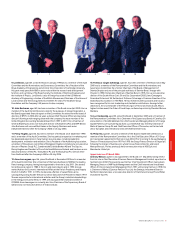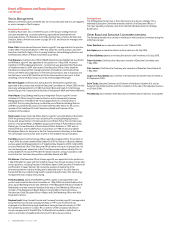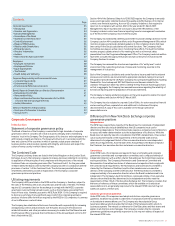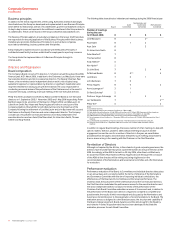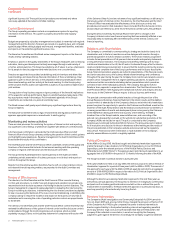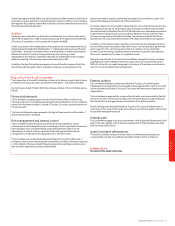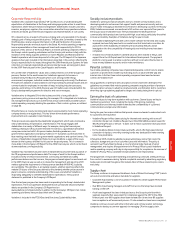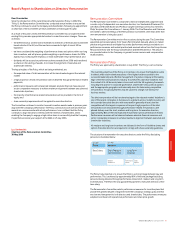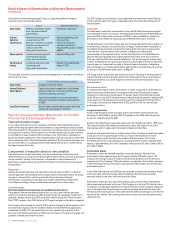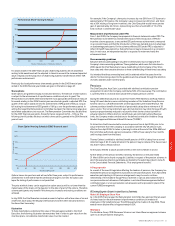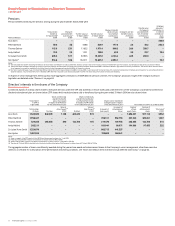Vodafone 2006 Annual Report Download - page 58
Download and view the complete annual report
Please find page 58 of the 2006 Vodafone annual report below. You can navigate through the pages in the report by either clicking on the pages listed below, or by using the keyword search tool below to find specific information within the annual report.56 Vodafone Group Plc Annual Report 2006
Corporate Governance
continued
significant business risk. These policies and procedures are reviewed and, where
necessary, updated at Executive Committee meetings.
Control Environment
The Group’s operating procedures include a comprehensive system for reporting
information to the directors. This system is properly documented and regularly
reviewed.
Budgets are prepared by subsidiary management and subject to review by both regional
management and the directors. Forecasts are revised on a quarterly basis and compared
against budget. When setting budgets and forecasts, management identifies, evaluates
and reports on the potential significant business risks.
The Executive Committee and the Board review management reports on the financial
results and key operating statistics.
Emphasis is placed on the quality and abilities of the Group’s employees with continuing
education, training and development actively encouraged through a wide variety of
schemes and programmes. The Group has adopted a set of values to act as a framework
for its people to exercise judgement and make decisions on a consistent basis.
Directors are appointed to associated undertakings and joint ventures and attend the
board meetings and review the key financial information of those undertakings. Clear
guidance is given to those directors on the preparation that should take place before
these board meetings and their activity at the board meeting. It is the Group’s policy,
where possible, that its auditors are appointed as auditors of associated companies and
joint ventures.
The acquisition of any business requires a rigorous analysis of the financial implications
of the acquisition and key performance figures. A sensitivity analysis takes place of the
key assumptions made in the analysis. Post investment appraisals of the Group’s
investments are conducted on a periodic and timely basis.
The Board reviews a half-yearly report detailing any significant legal actions faced by
Group companies.
The Executive Committee monitors legal, environmental and regulatory matters and
approves appropriate responses or amendments to existing policy.
Monitoring and review activities
There are clear processes for monitoring the system of internal control and reporting
any significant control failings or weaknesses together with details of corrective action.
A formal annual confirmation is provided by the chief executive officer and chief
financial officer of each Group company certifying the operation of their control systems
and highlighting any weaknesses. Regional management, the Audit Committee and the
Board review the results of this confirmation.
The Chief Executive and the Chief Financial Officer undertake a review of the quality and
timeliness of disclosures that includes formal annual meetings with the operating
company or regional chief executives and the Disclosure Committee.
The Group Internal Audit Department, reporting directly to the Audit Committee,
undertakes periodic examination of business processes on a risk basis and reports on
controls throughout the Group.
Reports from the external auditors, Deloitte & Touche LLP, on certain internal controls
and relevant financial reporting matters, are presented to the Audit Committee and
management.
Review of Effectiveness
The directors, the Chief Executive and the Chief Financial Officer consider that any
controls and procedures, no matter how well designed and operated, can provide only
reasonable and not absolute assurance of achieving the desired control objectives. The
Group’s management is required to apply judgement in evaluating the risks facing the
Group in achieving its objectives, in determining the risks that are considered acceptable
to bear, in assessing the likelihood of the risks concerned materialising, in identifying the
company’s ability to reduce the incidence and impact on the business of risks that do
materialise and in ensuring the costs of operating particular controls are proportionate
to the benefit.
The directors, the Chief Executive and the Chief Financial Officer confirm that they have
reviewed the effectiveness of the system of internal control and the disclosure controls
and procedures through the monitoring process set out above, which as noted
separately on page 55 does not include any statement of compliance with section 404
of the Sarbanes-Oxley Act, and are not aware of any significant weakness or deficiency in
the Group’s system of internal control. The directors, the Chief Executive and the Chief
Financial Officer have evaluated the effectiveness of the disclosure controls and
procedures and, based on that evaluation, have concluded that the disclosure controls
and procedures are effective as at the end of the period covered by this Annual Report.
During the period covered by this Annual Report, there were no changes in the
Company’s internal control over financial reporting that have materially affected or are
reasonably likely to materially affect the effectiveness of the internal controls over
financial reporting.
Relations with Shareholders
The Company is committed to communicating its strategy and activities clearly to its
shareholders and, to that end, maintains an active dialogue with investors through a
planned programme of investor relations activities. The investor relations programme
includes formal presentations of full year and interim results and quarterly statements
on key performance indicators. The Company holds briefing meetings with its major
institutional shareholders in the UK, the US and in Continental Europe, after the interim
results and preliminary announcement, to ensure that the investing community receives
a balanced and complete view of the Group’s performance and the issues faced by the
Group. Telecommunications analysts are invited to presentations of the financial results
and senior executives across the business attend relevant meetings and conferences
throughout the year. During the year, the Company hosts investors and analysts sessions
at which senior management from its largest operating subsidiaries, its largest joint
venture and certain associated undertakings deliver presentations which provide an
overview of each of the individual businesses. The Company, through its Investor
Relations team, responds to enquiries from shareholders. The Chief Executive and the
Chief Financial Officer meet regularly with institutional investors and analysts, who also
have access to the Chairman if they so require, to discuss business performance.
The principal communication with private investors is through the provision of the
Annual Review and Summary Financial Statement, the interim results and the AGM, an
occasion which is attended by all the Company’s directors and at which all shareholders
present are given the opportunity to question the Chairman and the Board as well as the
Chairmen of the Audit, Remuneration and Nominations and Governance Committees. A
summary presentation of results and development plans is also given by the Chairman
at the AGM before dealing with the formal business of the meeting. The AGM is
broadcast live on the Group’s website, www.vodafone.com, and a recording of the
webcast can subsequently be viewed on the website. All substantive resolutions at the
Company’s AGMs are decided on a poll. The poll is conducted by the Company’s
Registrars and scrutinised by Electoral Reform Services. The proxy votes cast in relation
to all resolutions are disclosed to those in attendance at the meeting and the results of
the poll are published on the Company’s website and announced via the regulatory
news service. Financial and other information is made available on the Company’s
website, www.vodafone.com, which is regularly updated.
Political Donations
At the AGM on 26 July 2005, the Board sought and obtained shareholders’ approval to
enable the Group to make donations to EU Political Organisations or incur EU Political
Expenditure, under the relevant provisions of the Political Parties, Elections and
Referendums Act 2000 (“the Act”). The approval given restricted such expenditure to an
aggregate limit of £100,000 in the period of 12 months following the date of the AGM.
The Group has made no political donations during the year.
At this year’s AGM, to be held on 25 July 2006, the directors propose to seek a renewal of
shareholders’ approval for a period of three years (until the AGM in 2009). The amount of
the approval for each year until the AGM in 2009 will again be restricted to an aggregate
amount of £100,000 (£50,000 in respect of donations to EU Political Organisations and
£50,000 in respect of EU Political Expenditure).
Although the directors are seeking shareholders’ approval for the next three years, as
with previous annual approvals, the Group has no intention of changing its current policy
and practice of not making political donations and will not do so without the specific
endorsement of shareholders. The Board seeks the approval on a precautionary basis, to
avoid any possibility of unintentionally breaching the Act.
Directors’ Indemnities
The Companies (Audit Investigations and Community Enterprise) Act 2004 came into
force on 6 April 2005 and, amongst other things, changed the provisions of Section 310
of the Companies Act 1985 to give companies the power to extend indemnities to
directors against liability to third parties (excluding criminal and regulatory penalties)
and to pay directors’ legal costs as incurred provided that they are reimbursed to the
Company if the individual is convicted or, in an action brought by the Company,
judgment is given against the director. Accordingly, the Company sought and obtained


